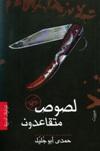Lusous Mutaqa'idoun (Retired Thieves)
Hamdi Abu Golail, Cairo: Miret, 2002. pp127
Reviewed by Youssef Rakha
Lusous Mutaqa'idoun, Hamdi Abu Golail's latest novel, is the semi-autobiographical record of the author-narrator's life in the popular suburb of Manshiyet Nasser near Helwan. Founded by President Gamal Abdel-Nasser some five decades before the events of the novel take place to house Helwan silk industry workers, Manshiyet Nasser has a certain historical significance that the author does not fail to make use of.
With typical irreverence, Abu Golail relates how Nasser, while on a visit to the silk factory, spotted some impromptu beds the workers had set up for themselves near the machines, expressing almost incredulous pride in the employees' being so hard-working that they chose to sleep in the factory as well as work there. On being told that the beds were there because the workers had no homes, the president pointed to an expanse of wasteland nearby and gave orders that workers' accommodation should be built.
In the novel, this story is told by Abu Gamal, a former worker at the factory and the owner of building number 36, where the narrator lives. And the book is full of such stories, emanating from the memory of Abu Gamal, as well as from those of other characters and from the author himself, and testifying to a remarkable range of experience and an impressive degree of narrative dexterity. The novel is also marked by an accomplished economy of means.
Rather than being a record of the social history of Manshiyet Nasser, or even of the personal history of the diverse array of characters that now inhabit it, the novel is a contemplative piece of confessional writing. In it, the author describes the lives of the residents of building number 36 in the course of reflecting on his own experience as a sentient human being, a Bedouin and an Egyptian citizen.
"Death is one of the alternatives always available as an easy way of eliminating danger," Abu Golail states in his epigrammatic prologue to the novel's Chapter Two. "Death is the purpose of every danger, and at the same time it is an ideal way of reconciling oneself with danger. To be hit by a car, finished off by a bullet or by a strong narcotic: these ways towards death are easier to take than trembling before danger." In so far as the novel contains a narrative, this is one that demonstrates this notion, while also being the story of an economically dispossessed Bedouin's struggle to integrate himself into city life -- a struggle that is at every moment beset by danger.
Beginning with an account of a day in the life of Abu Gamal, the novel progresses from a description of his immediate family to a description of the trials and tribulations of the larger clan that populates the building. In the course of this exposition, the novel's narrator is consistently shown as being an outsider, struggling to minimise his interaction with others in order to avoid what he believes could be the dire consequences of this.
However, he is unable to avoid the people with whom he is forced to live. Indeed, he is shown finding ingenious ways of outwitting them. Amer, his landlord's younger son, tries to burgle the narrator's flat, being thwarted only by the narrator's setting off an electric current in wires by his window. The narrator comments: "When [Abu Gamal] discovered that his son had been killed by a fatal electric current, he remembered that he had seen me... However, it would be shameful to kick me out of the building, and at the same time he would not be bold enough to admit that his son's blood was on my hands.
Instead he confronted me with a look that skillfully combined deep respect for me with puzzled determination to find an ending worthy of my deed."
The novel is remarkably entertaining, it being the various stories, together with the characters that tell them, that sustain the reader's interest. Thus, we find graphic descriptions of violent and sometimes obscene quarrels between Abu Gamal and his eldest son Gamal, a drug dealer and friend of a corrupt judge, in this book, as well as stories of the spectacular antics of the melodramatic and homosexual youngest son Seif. Amer is shown changing from a hashish smoker into a professional thief, and Ustaz Ramadan, a teacher of Arabic and a minor poet whose love for Amer's wife is as intense as it is pure, is also described. Such characters and the stories that are woven around them provide the book with humour, suspense and vitality. In addition, they reflect the nether realms of Egyptian society with a rare honesty.
Fear is the main emotion that conditions not only the narrator's life, but also his understanding of these characters' motivations and, to a greater or lesser extent, his own interactions with them. Since we see the characters through the narrator's eyes, however, they remain, despite their colour, somewhat ghost-like or two-dimensional, the population of his tormented mental landscape. And the narrator's long digressions, dealing with aspects of his family, as well as with his professional and sexual history, reinforces this view.
Finally, however, Lusous Mutaqa'idoun is a contemporary Egyptian novel that is readable, well-constructed and takes ample stock of the human experience it describes -- a rare thing indeed.
Retired Thieves
فعاليات

العربية السعيدة في بيت يكن
إبريل 15, 2025
العربية السعيدة، لتوركل هانسن وترجمة سوسن كردوش قس...

الأديب: رؤية ومسيرة ... حوار مع إيلان بابيه عبر زووم
مارس 15, 2025
تمت هذه الحلقة في 15 مارس 2025 ، تستطيع الان مشاهد...

مسافر يبحث عن ماء
فبراير 17, 2025
تقيم نقابة اتحاد كتاب مصرشعبة أدب الرحلات تحت رعاي...

مناقشة رواية النباتية لهان كانج الحاصلة على جائزة نوبل للأدب
نوفمبر 08, 2024
تمت منااقشة رواية النباتية يوم الجمعة 8 نوفمبر 202...
